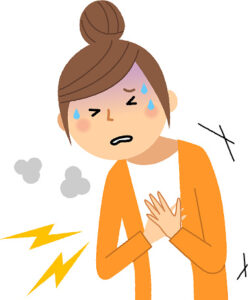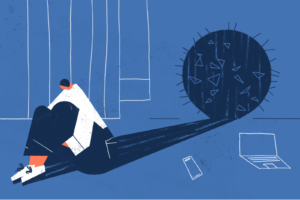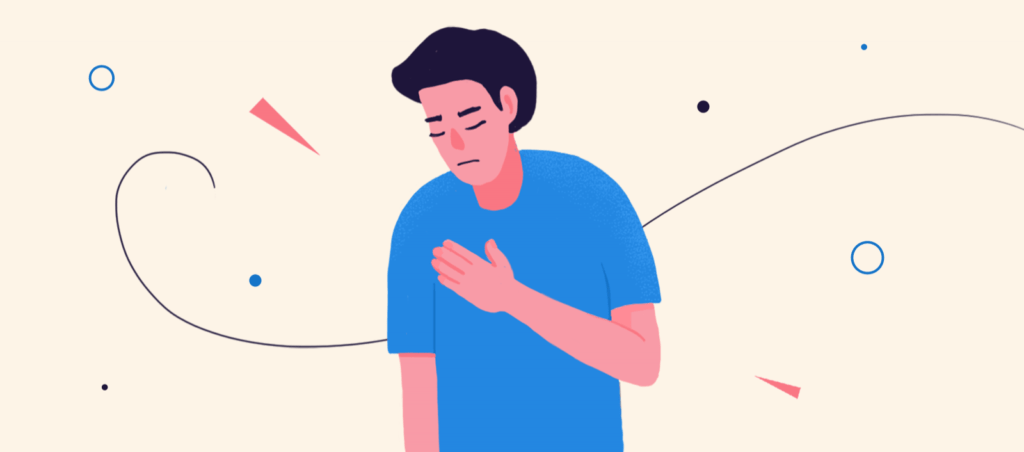Anxiety is a feeling of worry, nervousness, or unease. It can be mild or severe and can last for a short time or a long time. Chest pain is any type of pain that you feel in your chest. It can be sharp, dull, burning, or pressure-like. Many people experience both anxiety and chest pain at some point in their lives. In this blog post, we will discuss the causes of anxiety and chest pain, as well as how to get help if you are experiencing them.
Contents
Defining Anxiety
Anxiety is more than just feeling stressed or worried. It’s a real condition that can be diagnosed and treated by a mental health professional. Anxiety is the body’s natural response to stress. It’s a feeling of fear or apprehension about what’s to come.
The key to remember is that anxiety is a normal emotion that everyone experiences at one point or another. What separates people with anxiety disorders from those without is the intensity, frequency, and duration of their symptoms. This is what we call an anxiety disorder. There are many different types of anxiety disorders, including generalized anxiety disorder, social anxiety disorder, panic disorder, agoraphobia, and more.
Chest Pains In Anxiety

Chest pain is one of the most common symptoms of anxiety. It’s also one of the most frightening. Chest pain can be sharp, dull, burning, or pressure-like. It can feel like your heart is racing or fluttering, or like you can’t catch your breath. The pain may start suddenly or gradually and can last for a few minutes or several hours.
The intensity of the pain can vary from person to person. Some people only feel a mild discomfort, while others may feel a severe pain. They are often described as a tightness, pressure, or squeezing sensation. It can be localized to one area of the chest or it can radiate to other parts of the body, such as the arms, neck, jaw, or back.
It can be hard to tell the difference between anxiety chest pain and heart-related chest pain. If you’re having chest pain and you’re not sure what it is, call your doctor or go to the emergency room. It’s better to be safe than sorry.
Signs
There are several signs that you may be experiencing anxiety chest pain. These include:
- Shortness of breath
- Heart palpitations
- Pain or tightness in the chest
- Sweating
- Nausea or upset stomach
- Dizziness or lightheadedness
- Inability to catch your breath
- Physical discomfort such as sweating, shaking or feeling dizzy
Causes
There are many different causes of this condition.
- The most common cause is stress. When you’re under stress, your body releases hormones that prepare you for “fight-or-flight.” This increases your heart rate and makes you breathe faster. This can lead to chest pain and shortness of breath.
- Some people experience them in response to a specific trigger, such as public speaking or flying on an airplane. Others have no apparent trigger at all.
- There are also many medical conditions that can cause chest pain, such as heart disease, lung disease, and gastrointestinal problems.
- Anxiety and chest pain can also be caused by medications, such as beta-blockers, ACE inhibitors, and certain antidepressants.
Chest Pains From Anxiety v/s Other Conditions
It is necessary to note that not all chest pains have anxiety as a root cause. It can happen because of other physiological as well as psychological issues.
- The main difference between anxiety chest pain and other types of chest pain is that the anxiety chest pain is not caused by a physical problem. It’s caused by an emotional or mental condition.
- Other types of chest pain may be caused by problems with your heart, lungs, or gastrointestinal system. These problems can usually be diagnosed with a physical exam and tests, such as an EKG or CT scan. Anxiety chest pain, on the other hand, is often difficult to diagnose because there is no physical cause. That’s why it’s important to see a mental health professional if you’re experiencing anxiety and chest pain. They can help you figure out what’s causing your symptoms and develop a treatment plan.
- It must also be noted that just because anxiety is the primary cause of your chest pain, it doesn’t mean that there isn’t an underlying physical condition. In some cases, anxiety may worsen a pre-existing heart or lung condition.
If you notice any of these issues arising and causing disruptions in daily life, it is essential to get in immediate contact with a healthcare provider. They can run diagnostic tests, scans, imaging, or psychological evaluation to discover the root cause of issues and further plan a suitable treatment plan.
Treatment Options

There are various kinds of treatment options to manage the pains and aches caused by anxiety. These can either be professional help, self adoptive lifestyle changes, or a combination of both.
- Medication: If your anxiety is severe, your doctor may prescribe medication. The most common type of medication used to treat anxiety is a benzodiazepine. Benzodiazepines are anti-anxiety medications that can help reduce the symptoms of anxiety, including chest pain.
- Therapy: Cognitive-behavioral therapy (CBT) is a type of therapy that can be effective in treating anxiety and related pains. CBT teaches you how to change the way you think about and respond to situations that trigger your anxiety. This can help you manage your symptoms and improve your quality of life.
- Lifestyle Changes: There are also several lifestyle changes you can make to help reduce the symptoms of both the conditions. These include:
-Exercising regularly
-Eating a healthy diet
-Getting enough sleep
-Reducing stress
-Avoiding caffeine and alcohol
If you’re experiencing anxiety and chest pain, it’s important to see a doctor or mental health professional. They can help you figure out what’s causing your symptoms and develop a treatment plan. There are also several lifestyle changes you can make to help reduce the symptoms of anxiety and chest pain.
Conclusion
In conclusion, anxiety and chest pain can be caused by many different things. If you’re experiencing anxiety and chest pain, it’s important to see a doctor or mental health professional. They can help you figure out what’s causing your symptoms and develop a treatment plan. There are also several lifestyle changes you can make to help reduce the symptoms of anxiety and chest pain.
For more information, please contact MantraCare. Anxiety is a common mental health condition characterized by persistent feelings of worry, fear, and apprehension. If you have any queries regarding Online Anxiety Counseling experienced therapists at MantraCare can help: Book a trial Anxiety therapy session


